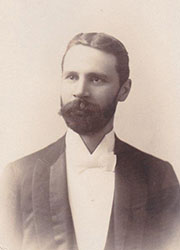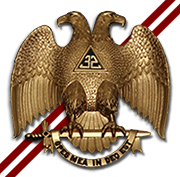

William Harrison Brown Esq, 33° PP
(Feb 26, 1864-Apr 6, 1916)
1891 - Raised, Rural Lodge #316
1893 - Master, Rural Lodge #316
1891 - 32° Consistory of Western MO, Kansas City
1893 - Knight Commander of the Court of Honour
1896-99 - Venerable Master, Adoniram Lodge of Perfection
1896 - Life Member
1899 - Coroneted: 33° Inspector General Honorary
1899 - Royal Order of Scotland
1891 - Exalted Royal Arch Degree, Orient Chapter #102 RAM
1891 - Knighted, Kansas City Commandery #10
1892 - Royal & Select Master, Shekinah Council #24
1891 - Created Ararat Shrine
1895-96 - Potentate, Ararat Shrine Temple
Occupation: Attorney
Fairness, justice, kindliness and nobility of character were the distinguishing features of the lite record of William Harrison Brown, who from life's morning to its eventide was a resident of Kansas City, honored by his professional associates, respected by all who came into contact with him, but more than that. loved by those whom the opportunities of friendship brought often to his side. He was born February 26, 1864, and in the acquirement of his education attended the ward and high schools of Kansas City and after pursuing a preparatory course entered the University of Missouri in the year 1880. He applied himself with such diligence to his studies that he completed in three years the regular four-year course and was graduated with honor when a youth of nineteen. In 1884 he was admitted to practice at the Jackson county bar and entered at once into a partnership with his father, P, S. Brown, Sr., and Benjamin Chapman under the firm style of Brown, Chapman & Brown. He remained continuously a member of the firm until January, 1916. when his failing health obliged him to withdraw. In the meantime various changes in the partnership occurred and its personnel at the time he put aside practice was indicated in the firm style of McCune, Harding, Brown & Murphy, During the last twelve years of life he suffered from a physical affliction that compelled him to be an office rather than a trial lawyer, yet he was one of the most indefatigable members of his firm and his counsel was of the greatest value to his associates. He died in Kansas City, Missouri, April 6, 1916.
In 1896 William H. Brown was united in marriage to Miss Caroline Miller, who by one of his biographers has been mentioned as "a most estimable lady, whose devotion to her husband during their married life, and especially during the past ten years, when much of the time he was physically incapacitated, has made the closing years of his life bright and sweet, in the midst of trial and suffering, through her loving administrations and sympathy," In his later years Mrs. Brown was the daily attendant to her husband on his trips to and from his office and their interests were always as one.
Mr. Brown was widely known not only throughout Kansas City but throughout the country as a thirty-third degree Mason. In December, 1890, he was initiated into Rural Lodge, #316, A, F. & A. M., and became a Master Mason on the 28th of January, 1891. In the fall of the same year he was elected senior warden of his lodge and in 1893 was chosen worshipful master. On the 30th of April, 1891, he became a member of Orient Chapter, No. 102, R.A.M., and on February 26, 1892, was made a member of Shekinah Council, No. 24, R, & S. M. He joined Kansas City Commandery, No, 10, K. T., July 23, 1891, and on the 11th of September of the same year was made a Noble of the Mystic Shrine in Ararat Temple and during the years 1895 and 1896 was illustrious potentate thereof. He was long a most active worker in the Scottish Rite bodies, taking the degrees in November, 1891, and in October, 1893, he was elected by the Supreme Council, thirty-third degree, a knight commander of the Court of Honor and six years later was elected and coroneted a thirty-third degree honorary member at Washington, D. C. At the same time he received the Royal Order of Scotland degrees in the provincial grand lodge of the order. There was no other fraternal organization that received so largely his aid and he was everywhere spoken of as a most beloved member of the organization by reason of his amiable nature, his talents and his estimable characteristics. At his passing the Kansas City Masonic bodies prepared a most beautiful and fitting memorial of him, speaking of him as one "whom to know was to love."
While his activities in Masonry made Mr. Brown widely known throughout the country, he ranked in Missouri as one of the eminent representatives of the bar of the state, and beautiful tributes were paid to his ability as a lawyer and to his character as a man in a joint memorial service of the Kansas City Bar Association, held in honor of Judge Isaac H. Kinley and William Harrison Brown. On this occasion Judge McCune said: "I had an affection for him which I think was rather unusual among men, and that was one of the characteristics of Harry Brown, that those who came in contact with him soon learned to love him. It was true in our office. His associates and the employees of the office all held him in affection, and it was a peculiar thing about him and his relationship with his clients, that they seemed to hold him in affectionate regard and came to him not only as the counselor, but as a friend, and brought their troubles of every kind to him. When I became associated with him in 1909 he was already afflicted with a fatal disease, and none knew better than he that there was to be no improvement in his condition. When a man of weak determination or less will would have surrendered and quit the fight or at least would have become morose and nervous, Mr. Brown, through all these years of his physical affliction, has never betrayed the slightest impatience with his lot. He has never been nervous or irritable. On the other hand, sunshine had radiated from his face, and his office has been a center of good cheer and of encouragement for those with whom he has been associated. The nature of his affliction necessarily confined him largely to his office. He had difficulty in standing upon his feet, and so he took little part in the active litigation; but that very fact made him unusually valuable to his associates. Naturally of a just and judicial turn of mind he was, from necessity, removed from the excitement of partisan litigation, and we found him an exceedingly valuable man to go to to consult with, and we really found ourselves trying our cases before him in advance; and it was remarkable how frequently the observations which he made in discussing these cases would coincide with the observations made afterwards by the judge before whom the case was really being tried. It is well that we have men like Harry Brown and Isaac Kinley to refer to as examples of honorable men who have labored in their profession. Thank God they are not all dead; there are others. But these men were of a type to whom the emoluments of the profession were a secondary consideration. I believe that to be absolutely true. They were men to whom their professional good name was the dearest thing on earth; and they found joy and consolation in the fact that in serving their client they did not necessarily do injury to their adversary; and that they were sworn ministers of justice, and that as such it was their duty to maintain rather than to destroy the law as an institution, and they labored to strengthen the foundations of the government under which they lived, rather than to destroy It. That should be the duty of every lawyer. It is better for us that we have known these men and better for the world that they have lived in it, because they have made a permanent, distinct contribution to society and to civilization. It a consciousness of good deeds well performed can bring repose to the soul of the departed, then these two men, of a certainty, have laid down to pleasant dreams and will rest in peace."
Interred: Elmwood Cemetery, Kansas City, MO, block K lot 25

